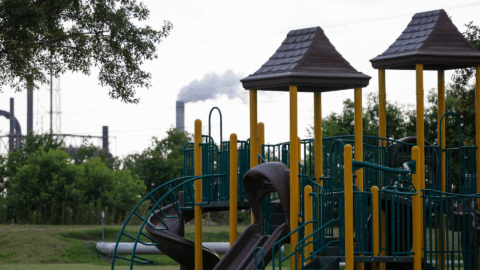A healthy state of affairs: U.S. states do the public’s bidding by acting to control dangerous chemicals, even as Washington fiddles
Richard Denison, Ph.D., is a Senior Scientist and Jennifer McPartland, Ph.D., is a Health Scientist.
A new report documents that state-level legislation to control toxic chemicals adopted over the past eight years has passed with overwhelming bipartisan support. The report also highlights that both the pace of adoption and the scope of such legislation have grown significantly – a trend expected to continue until Congress enacts meaningful, comprehensive reform of the Toxic Substances Control Act (TSCA).
The report, Healthy States: Protecting Families While Congress Lags Behind, was released today by Safer Chemicals, Healthy Families and Safer States, a coalition of state-level organizations working for chemicals policy reform. The report analyzes 71 chemical safety laws that were adopted between 2003 and 2010 in 18 states encompassing 41% of the U.S. population. The state laws enacted broadly fell into two categories: those that place restrictions on individual dangerous chemicals, and those that embrace more comprehensive chemical policies.
The report’s main finding is that these laws passed with overwhelming support – and that support was strongly bipartisan:
- Of more than 9,000 roll call votes cast, 89% favored the legislation, outnumbering opposing votes by more than 8 to 1.
- Nearly three-quarters of Republican legislators (73%) voted in favor of the legislation, as well as nearly all Democrats (99%).
- Ten Republican governors and 12 Democratic governors signed these bills into law.
What we find most remarkable about these new numbers is that they mirror almost exactly the views of the American electorate.
We blogged earlier on the results of national polling conducted over the summer by the Mellman Group. That polling found that:
- 84% of likely voters polled want tighter controls on chemicals, and 82% favor legislation that would do so – just a bit lower than the 89% of votes cast in favor of similar state laws.
- 75% of Republican likely voters want tighter controls on chemicals, and 70% favor legislation that would do so — very much in line with the 73% of votes cast in favor of state laws by Republican legislators.
It would appear that State legislators are quite in tune with the American electorate – not to mention well ahead of Congress in enacting strong chemical policy reform legislation. We’ve made this point before, when the Environmental Council of the States (ECOS) – comprised of the heads of state and territorial environmental agencies – gave unanimous support to a resolution calling on Congress to enact comprehensive TSCA reform.
Faced with years of inaction at the federal level, states have forged ahead to protect the health of their citizens. The year 2003 marked a new era of chemical legislation that addresses health in addition to environmental concerns posed by chemicals. This broader scope is no accident: It reflects the growing evidence linking chemical exposures to serious chronic human diseases and disorders that are rising in incidence. These range from certain childhood cancers to obesity to autism to Alzheimer’s.
States have courageously acted where and when the federal government should have but hasn’t. But there are limits to states’ resources and authority, and we clearly need a national solution. Ultimately it is only Congress that has the power to hold the chemical industry accountable for the safety of its products. Moreover, it is unacceptable that the extent of protection of Americans’ health depends on where they live. As it stands now, those 41% of Americans who live in states that have acted are better protected from chemical hazards than their fellow citizens in states that have not.
The new report compellingly shows that there’s every reason for the new Congress to proceed full speed ahead come January with reforming TSCA, our nation’s primary chemical safety law: The public is demanding it, and states are clearly rising to the challenge.
And the report shows that we can expect the states to continue to act if Congress doesn’t. They’re certainly poised to do so: 31 of the 71 laws passed since 2003 were enacted in the states’ most recent (2009-2010) legislative sessions – more than in any of the preceding sessions. And the 18 states that have now passed chemical safety laws represent more than a tripling of the number of states (5) that did so in the 2003-2004 legislative sessions.
Congress, it’s time to heed thy voters and extend this healthy but incomplete state of affairs to all 50 states.












